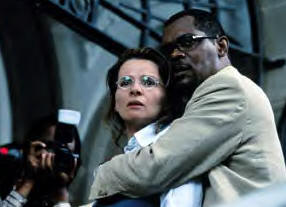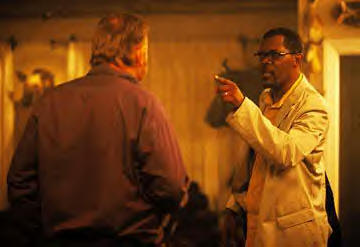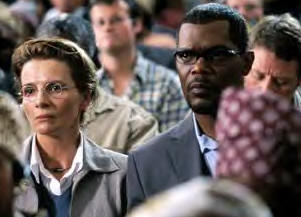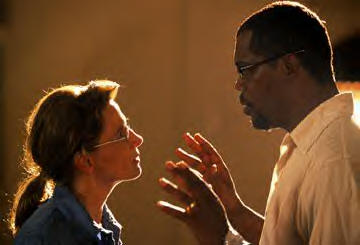Few actors prompt the same kind of awe that Samuel L.
Jackson does after having played a remarkable range of characters; from
the tough gangster in Pulp Fiction to the heroic Mace Windu in
Star Wars: Episode II - Attack of the Clones. Through the eyes of a
harsh American journalist, Langston Winfield, he tackles a painful
subject, South Africa's history of apartheid and the efforts at
reconciliation in director John Boorman's In My Country. Based on a
book and true stories of the time, he presented a hardnosed view; also
based on a true story, Jackson offered tough love in Coach Carter,
a surprise hit earlier this year. Jackson keeps working; on these heels of
these films will be XXX 2: State Of The Union, then Star Wars:
Revenge Of The Sith and then The Man with Eugene Levy.
What inspired you to do
In My Country?
I knew the Truth and Reconciliation Commission was going
on and there were no real new stories about it. I had friends in South
Africa and when I was in college I had friends who were exiled because of
apartheid. So I thought it would be interesting for an audience to find
out what happened when Mr. [Nelson] Mandela got out of prison and why
there wasn't this huge civil war that everybody was expecting, and to find
out the process in healing that was going on in South Africa.
What difficulties did you encounter doing this role?
It's pretty simple to play a reporter [laughs]. In this
instance I was not going about the technical business of reporting.
Occasionally you see me sending in a story or dealing with the fact. I did
a lot of note taking when I was watching the people testify. Essentially,
my job was to be a westerner who comes with a sense of western justice to
a situation where he's learning about African justice and finding a way to
accept it and to accept a South African radio journalist as a human being
and not the enemy that he had preconceived her to be.
How did you prepare for this role?
I didn't have a lot of time because I just finished
SWAT and two days later had back surgery. Then, ten days later I was
in South Africa. My preparation was knowing the people in South Africa
reading up on
Truth and Reconciliation Commissions... where they were,
how long they took... and reading the novel while I was on my back.
Talking to auntie
about what had happened and how this guy was. "Was he a real guy or was he
a combination of several guys?" Just being ready to be in the moment.
Fortunately we had all these South African extras that had unfortunately
lived through apartheid and fortunately they were part of the truth and
reconciliation commission. Naturally, they hadn't read the script. They
didn't know what they were coming into. They just knew that they had a
job. The first time they heard the stories, John [Boorman] told them to
just react naturally to whatever you hear. And when they heard the stories
they gasped the same way. They spoke out or yelled out in Zulu to the
things they heard. And we had no idea what was about to happen. All of a
sudden, this one guy was yelling out in Zulu and there was a response.
Then they all just broke into song. We were like “Oh my God.” It was
incredible. The authenticity they brought to it, lent a lot to the film.
Being in those particular places puts you in a different mindset. It's
incredibly to feel the energy of a place that's being reborn especially in
a place like Capetown. Johannesburg has another kind of energy. It's like
New York on crack. With all these newborn freedoms, it is one of the few
places in the world where guide books tell you that if your driving a car
at night don't stop for red lights. Run the light. If someone's
approaching the car run the light. Capetown is totally different. You can
walk the streets at night. There are restaurants, great seafood, great
night life, a huge gay community in Capetown's a beach community. There's
tourism, wine country and golf courses... all kinds of stuff.
 Why is Johannesburg so different?
Why is Johannesburg so different?
Johannesburg is a city. It's contained. It's a lot of
people in a small place like Manhattan. A whole bunch of people. There are
millions of people there. Capetown is not like that. It's a resort town.
It's crowded during September during January where it's real hot and
people are escaping the winters that they live with in other places. When
we shot it was a low season from March to June. So the beaches were kind
of empty. The hotels were kind of empty. We had great hotel rooms. We were
able to move around with a lot more freedom and drive to places we needed
to without the crowds.
Would the movie have been seen differently if it had been
seen through the eyes of an African who actually experienced apartheid?
Yeah, probably. But we're also dealing with the fact that
she benefited from apartheid in a specific way. And didn't acknowledge
what was going on in her name or to afford her the comforts that she had.
So the revelations for her are the details like she says. Like she didn't
know her family was involved. So we're finding out something. The story is
essential about Langston and her and what they find out about each other
and about themselves while they're doing it. so it wouldn't have been
right to do it though someone else's eyes. Plus all those other people are
there testifying and doing those stories and we're showing them through my
eyes or her eyes and the reaction of us to what we see and how it affects
us and brings us together.
How was it working with director John Boorman
[Deliverance, Excalibur]?
I had a great time with John. During the rehearsal process
we worked out a lot of things. We talked about a lot of different things.
South Africans have their own rhythm and pace in doing things. John's a
very patient man. And he allowed Juliette and I create things on the
inside of the rehearsal structure sometimes that were different from hat
we actually worked out in another kind of space. And it led itself to
something for Juliette and my relationship. It evolved to another place
that we didn't know it would evolve too. Just because we spent a lot of
time together in these rooms and traveling from place to place and being
together every day, things became a little more complicated for us
sometimes and easier for us to do sometimes.
Boorman
does lots of rehearsals. How does that contrast other directors who have a
very different approach that you've worked with?
Rehearsal is valuable to me because shooting a movie is
controlled reality. People who like to go out there and do it
spontaneously always crack me up because it's like, how are you going to
know where to put the camera if we haven't rehearsed it. How do you know
whets going to happen or what we're going to do if we're doing it
spontaneously? Its okay to be in an improvisational space like mike lee is
or theoretically he is. So I don't know. I like to rehearse cause I'm use
to rehearsing cause I come from the theatre. I think it's very valuable.
I'll know what you're going to say you know what I'm going to say. I know
when you shut up and when ill shut up. You'll know if I'm going to pick
something out and throw it at you or not. I don't want to surprise you. It
has to be controlled in a way and sometimes you want the director to do
that yet or go that high etc. so you learn a lot through rehearsal about
what's going to happen and what needs to happen so the story can rehearse.
So I don't mind it.
 Is Quentin Tarantino approach very different?
Is Quentin Tarantino approach very different?
No. Quentin rehearses too. We rehearsed Pulp Fiction
so thoroughly. It was incredibly... we had tape on the floor for the
killing room. We knew how many steps it was from the truck of the car to
the door of the apartment building. Front the front door to the apartment
building to the elevator. How wide the elevator was. We knew how many
steps it was from the elevator to the killing room door. To the other
little space we went to talk too. Before we went back so that we never had
to look down we could just do it. we did that for like a month. So when we
got there. It was a piece of cake. We did that same thing with Jackie
Brown. Quentin rehearses.
Did you find it difficult acting out such tough roles?
Acting is fun for me. I like the process of creating
someone and being in another situation and suspending my own reality. I
like being able to step into that space safely and letting go emotionally
and coming back to myself. Its one of the few places you can do that.
What would you like audiences to get from seeing this
film?
Hopefully that principle of "Onobuntu" will strike people.
They'll get it that what affects me affects you and affects everybody
because when you look at the state of the world that's pretty much what's
going on. We're in this war with Iraq and that's affects me and you. It
affects the Iraqi people and a whole lot of people everywhere else and
it's a ripple effect that goes out. When it was just the Arabs and the
Israelis, it affected them, us, and a lot of other people [as well]. When
the British and the Irish were fighting, little did we know it would
affect us too. So the more we start to realize that there are principles
out that embody understanding, forgiveness, and cleaning the slate and
starting over [the better the world will be]. If only two or three people
get it and they start to use it in their daily lives, then, in some way,
is a good thing. At least having the information [will get people] to tell
others to see this movie. It's thought provoking. It's got something and
maybe they don't know what it is its something that needs to be seen or
heard and experienced in another kind of way?
 What
about racism in America these days?
What
about racism in America these days?
America is okay on racism. There is a certain factor or
faction of people that's always going to be racist because they're not
striving in a particular way so they think that everybody who does better
or gets advancements no matter if they're not of their own particular ilk,
they don't want people coming in the country. They don't like foreigners,
blacks, Asians, or Hispanic Americans because these people are making
progress and they're making strides. But the fact is that we are making
those strides even in my business. People always say how is racism in the
movie business but recently, we had five African Americans as Oscar
nominees. There are Hispanic nominees, Asian nominees. The reflection of
the world as we see it is now being reflected in our movie world in terms
of the kind of people that are our movies stars, directors, behind the
scenes creating and writing. The world is being reflected the way we see
it as a multicultural pallet. The fact is that for the past six weeks the
box office in the number one position is being dominated by African
Americans starting with Coach Carter, Are We There Yet and
Hitch. So people are embracing stories and
entertainment and not the ethnic qualities of film. Things are better and
people are starting to live their lives the way we want,
Were you surprised by the reaction to
Coach Carter?
No. I actually think that when you give people something
that speaks to a specific value system. And that it's presented in a way
that they can share it with their kids and enjoy it. I've had a lot of
people tell me that its amazing that they've watched this movie with our
kids and we talked about the movie and they promised to do better in
school and they got the message and we enjoyed it together. They want to
go back and see it again. Take some other kids. The film beat the kids
over the head with the message they were trying to get to them. And
hopefully they will hold on to that and keep those promises. But they do
have the information now that being a sports star is not the end or be all
to who you can be. And parents are really glad about that. In fact the
film opened pretty well in the UK last week. So the basketball metaphor is
there but people are replacing it with soccer and cricket and everything
else those kids play too.
Was it more difficult playing a real character?
Not really. Ken [Carter, the real coach] was there and I
met him. It was important to me that I look at Ken and see his character,
the strength of his determination, and the way he carried himself. He was
very direct and dogmatic about his views and how I would portray that.
Other than that, I wasn't going to try and do any of his physical
characteristics or emulate him in any other way other than his ties.
That's about it [laughs].
How do you decide what roles to do?
What happens is that scripts come across the desk. I read
them. I find one that intrigues me. The story is interesting; the
character on the inside is compelling. It's going to challenge me in
specific ways as an actor and hopefully I'll learn something in a specific
way or go in another direction people aren't expecting me to go. And I'll
say I want to do it. And we'll set up the meetings and the process starts.
In the mean time I'm still reading scripts. And things come. So the first
one is ready to go the one I do. And if the next one is ready to go right
after that I'll do that one. If not then I'll do the one that's after
that. It's just a matter of logistics on terms of who's ready to go and
when I'm ready to do it. So it could be the studio film is ready and the
independent is not. Or vice versa. So you just bounce around for what's
ready. It's not a plan. I go with whatever is ready.
 Is
this your first love scene in a feature [with co-star Juliette Binoche]
and is that important to you?
Is
this your first love scene in a feature [with co-star Juliette Binoche]
and is that important to you?
It's not a big deal but it's not my first love scene. I
had one in Caveman's Valentine, so I've been naked in a room with
another actress. It's not exciting either.
Have you ever had an interracial romance?
Yes. Believe me there's no difference as much as people
would like to think so. Of course, she is French, though. There are points
for that. It is Juliette Binoche!
Do you like being a part of the
Star Wars
veteran
club?
Yeah, it's a really great family to be apart of. It's kind
of freaky with people from the streets. There are so many Star Wars
religious fanatics. In Brazil there were these people camped outside the
hotel called the Jedi council of Rio. Yeah I'm really proud that I'm
finally in something that will be studied broken down revered and all
kinds of things for the cinematic history of the world. And I sat in the
theatre the first time it came out and I wished I could be in something
like that and my wish has come true. It doesn't happen that often.
Is it more important to get an Oscar?
I don't think getting an Oscar is going to define my
career. I think that at this point people respect what I do and are ok
with the respect I have from the audience members and my peers. Getting an
Oscar only means you were the best that year. It doesn't mean you're the
best forever.